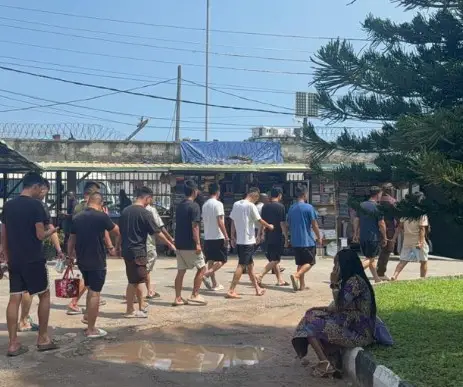Crime & Law
9 Chinese nationals jailed in Lagos

A Federal High Court in Lagos has sentenced nine Chinese nationals to one year in prison each after finding them guilty of cybercrime-related offences, including economic sabotage and financial terrorism.
The convicts—two of whom are women—were also fined ₦1 million each.
Those sentenced include: Xiang Hui, Hai Rong, Liu Gang, Ji Geng, Li Dong, Huang Bo, Xhiong Zhen, Lai Feng, and Deng Qiang.
The Economic and Financial Crimes Commission (EFCC) had arrested the group during a raid on December 10, 2024, at a building located in the Oyin Jolayemi area of Lagos. The operation led to the detention of over 700 individuals on suspicion of involvement in cyber terrorism and economic crimes.
During Thursday’s court proceedings, EFCC prosecutor Nnemeka Omenwa informed the court that the defendants had opted for a plea bargain. Their lawyer, Folarin Damela, confirmed this development and asked the court to accept the agreement.
Following this, the charges were formally presented, and the accused all entered guilty pleas. They also confirmed they had willingly entered into the plea deal.
“Following their guilty pleas,” Omenwa said, “we urge the court to convict and sentence them in accordance with the plea bargain agreement.”
The defence did not oppose the request.
Justice Daniel Osiagor thereafter accepted the plea and sentenced each defendant to one year in prison, starting from the date of their arrest—December 10, 2024.
The court also ordered that the Nigeria Immigration Service should repatriate the convicts to their country of origin upon completion of the prison term.
Osiagor also ordered that all items found on the convicts, including furnitures and laptops, should be forfeited to the Federal Government of Nigeria.
According to EFCC, the convicts committed the offences on Dec. 10, 2024 within the court’s jurisidiction.
EFCC said that the convicts wilfully caused to be accessed, computer systems organised to destabilise and destroy the fundamental economic and social structure of Nigeria.
The commission added that the convicts employed Nigerian youths for identity theft and to hold themselves out as persons of foreign nationality, with the intent to gain financial advantages for themselves.
The offences contravene Sections 18 of the Cybercrimes (Prohibition, Prevention) Act of 2015 ass amended in 2024, and Section 2(3) (d) of the Terrorism (Prevenion, Prohibition) Act, 2022.





















